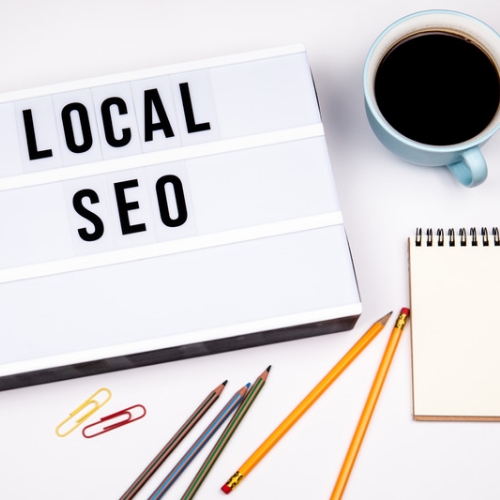
How Local SEO Can Boost Small Businesses
In the digital age, small businesses face fierce competition both locally and globally. While traditional marketing methods still play a role, online visibility has become essential for sustained growth. Local SEO (Search Engine Optimization) is a powerful tool that can help small businesses connect with local customers, improve online presence, and drive foot traffic to physical stores. In this blog, we’ll explore how local SEO can boost small businesses and provide actionable tips to get started.
What is Local SEO?

Local SEO involves optimizing your business’s online presence to attract more customers from relevant, location-based searches. These searches typically focus on geographic-specific queries, such as “coffee shops nearby” or “plumbers in [city name].”
For small businesses, focusing on local SEO offers a competitive advantage by making it easier for potential customers in your area to find you online.
Why Local SEO Matters for Small Businesses

Increased Visibility
Research indicates that nearly half of all Google searches are looking for local information. If your business is properly optimized for local search, it is more likely to show up in search results when people near you are looking for your product or service.
Higher Foot Traffic and Conversions
Many people searching for local businesses intend to visit them physically. For example, studies show that 76% of people who perform a local search on their smartphones visit a nearby business within the day. Local SEO ensures your business stands out when customers are ready to make a purchase.
Cost-Effective Marketing
Local SEO is a highly cost-efficient marketing approach when compared to traditional methods. Once your online presence is optimized, it works continuously to attract customers, offering long-term benefits.
Building Trust and Credibility
When your business appears in local search results, especially in Google’s Local Pack (the top 3 listings shown on a map), it enhances your credibility. Positive reviews and ratings on platforms like Google My Business also contribute to building trust with your audience.
Local SEO Tips for Small Businesses

To harness the power of local SEO, small business owners can take the following steps:
- Optimize Your Google My Business (GMB) Listing
Google My Business (GMB) is a free tool that lets businesses manage their online presence on Google Search and Maps. To optimize your GMB listing:
- Claim and verify your business on GMB.
- Make sure your business name, address, contact number, and operating hours are accurate and kept up to date.
- Add photos of your business and products.
- Encourage satisfied customers to leave reviews.
2. Ensure Consistent NAP Information
NAP stands for Name, Address, and Phone Number. Consistency across all online platforms—your website, social media, and directory listings—is crucial for local SEO. Inconsistent information can confuse customers and search engines, lowering your credibility.
3. Use Local Keywords
Incorporate location-specific keywords into your website content, meta descriptions, and blog posts. For example, instead of ‘flower delivery,’ use ‘flower delivery in [city name].’ Tools like Google Keyword Planner can help identify relevant local keywords.
4. Create Location-Specific Content
Develop content that caters to your local audience. Write blog posts about community events, local news, or guides tailored to your area. This not only attracts local readers but also signals to search engines that your business is rooted in the community.
5. Leverage Online Reviews
Positive reviews on platforms like Google, Yelp, and Facebook can significantly impact your local SEO ranking.
Respond to all reviews—positive or negative—to show customers you value their feedback.
Politely request reviews from satisfied customers.
- Optimize for Mobile Users
Optimize your website for mobile devices, focusing on fast loading speeds and an intuitive user experience. - Build Local Backlinks
Backlinks from reputable local websites signal to search engines that your business is relevant in the community. Partner with local organizations, sponsor events, or collaborate with influencers to gain quality backlinks. - Use Schema Markup
Adding schema markup enables search engines to interpret your website’s content more effectively. Highlight important details like your business address, phone number, and operating hours. - Monitor and Analyze Your Performance
Leverage tools such as Google Analytics and Google Search Console to monitor your website’s performance, pinpoint strengths, and refine your strategy as needed.
The Future of Local SEO for Small Businesses
Local SEO is evolving alongside technology. Voice search, for instance, is becoming more prevalent, and businesses need to optimize for queries like ‘Where’s the nearest [business type]?’ Additionally, features like augmented reality (AR) in local search could revolutionize how customers find and interact with businesses.
Staying ahead in local SEO means keeping an eye on these trends and adapting your strategy as needed.
Common Local SEO Mistakes to Avoid

Even with the best intentions, some small businesses make mistakes that hinder their Local SEO efforts. Avoid these common pitfalls:
- Ignoring Mobile Optimization: Over half of local searches are performed on mobile devices. Ensure your website is mobile-friendly, fast, and easy to navigate.
- Inconsistent NAP Information: Having different addresses or phone numbers listed across platforms confuses search engines and customers.
- Neglecting Reviews: Failing to ask for or respond to reviews can harm your credibility and rankings.
- Keyword Stuffing: Overusing keywords in an unnatural way can lead to penalties from search engines.
- Missing Out on Local Backlinks: Skipping opportunities to build connections with other local businesses or organizations limits your visibility
Conclusion
For small businesses, local SEO has become an essential component of a successful digital strategy. By optimizing your online presence, leveraging tools like Google My Business, and creating locally relevant content, you can connect with more customers and grow your business sustainably.
Start implementing these local SEO tips today, and watch your business thrive in your community.









